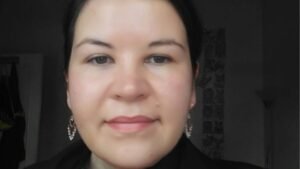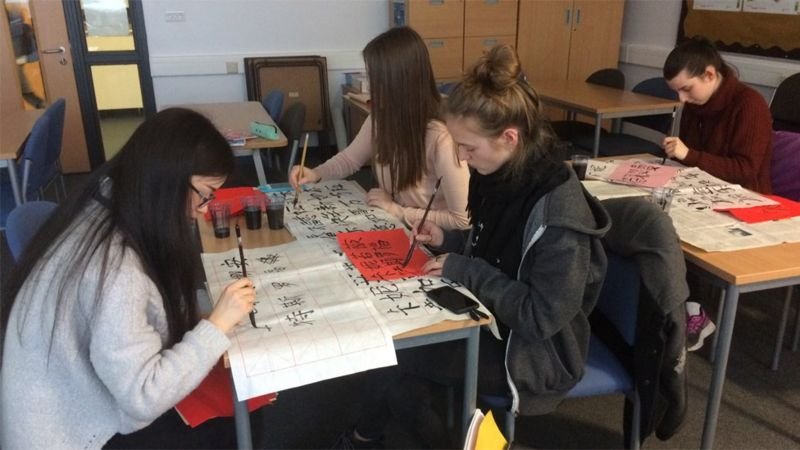The number of teenagers learning foreign languages in UK secondary schools has dropped by 45% since the turn of the millennium, BBC analysis has found.
The reaction to the research was mixed. Why learn a foreign language when English is spoken by hundreds of millions of people worldwide, some people wondered.
Others questioned the need for a second language when translation technology is advancing so quickly.
But many speakers of foreign languages extolled the benefits. Four native English speakers tell the BBC how making the effort to learn a second language is important – and how it changed their life.
‘It gave me the confidence to interview footballers’
When Alex Chaffer moved to Germany four years ago, he could only say “hello” and “thank you” in German.
He had not learnt the language at school, but was starting off a career in sports journalism and had the opportunity to go to Germany.

When he first arrived, he discovered his accommodation had fallen through.
“I had been scammed,” he said. “I couldn’t speak to anyone because I didn’t have the language, I was lost.”
“The first year I was here I didn’t learn a lot. I then had a German girlfriend that helped massively, having someone force me to do it and hearing it around all the time. She would speak in English and I would speak in German.”
The 23-year-old is now fluent and works on the website of Germany’s top football league, Bundesliga.
He said that in his job, he was “embarrassed to not know the language” and learning German has given him “so much confidence”.
“I would be worried about going to the shops and restaurants,” he said.
“Even professionally, I didn’t interview footballers for three years because I didn’t have the confidence in my language but now I can go up to any player. It’s totally changed my way of living.
“It’s opened me up as a person professionally and personally.”
‘I gave my children the gift of a second language’
James Westgarth’s first introduction to a foreign language was at school, a comprehensive in west London where he learnt French.
“My parents had no language skills but they encouraged me so I could order food etc when we went on holidays,” he said.
“The result is a 23-year international career. I spent 13 years at Airbus in Toulouse and the US and am now a sourcing director at a subsidiary of Lufthansa in Frankfurt.”

‘Why do we see languages as nice but not important?’
Being introduced to languages at a young age is something that teacher Ellie Baker believes strongly in. She founded BilinguaSing – which runs musical French and Spanish classes for children.

Since 2013, I’ve been teaching babies and upwards,” Ms Baker said. “My business is about empowering families.
“We cannot afford for children not to learn languages. We should be equipping them [for] whatever Brexit is going to bring.”
Among the benefits of learning a second language is the potential to “boost brain power”, Ms Baker’s company has said.
Studies have suggested that learning a second language can slow brain ageing, and can lead to higher mental function in the brain.
She said schools are still overly focused on qualifications rather than skills for life, like languages.
“Why do we look at learning a language as nice to have but not important? Why are we more worried about a child having a lower GCSE grade than average?
“The future of our kids will not hinge on academic abilities as much as it has done,” she said.
“We’re still really focused on academic grades. I’m not saying qualifications are not important, but it’s not everything. We have to think about what the kids need for their future.”
‘Foreign languages did wonders for my English’
Cassandra Scott, from Edinburgh, studied three languages in her final year at school: Advanced Higher French and German as well as beginners level Russian, which her French teacher taught “just for fun”.

She is now a freelance translator in Edinburgh, and said: “Learning languages at school really set the course for my career.”
“I went to Fortrose Academy in the Highlands, where we had brilliant language teachers. It’s a state school, but they offered us so many amazing opportunities.
“Learning two foreign languages also did wonders for my English. It gave me a new perspective on my own language and also gave me extra practice in identifying parts of speech, and later on, analysing literature.”
Since studying interpreting and translation, she has worked as an in-house translator and an assistant language teacher (for English) in Osaka, Japan.
“I now work as a freelance medical and marketing translator,” she said. “Most of my work – about 80% – is in German.
“I love my job and I’ll always be thankful to my language teachers at school who taught me how to learn.”
Published by BBC
https://www.bbc.com/news/uk-47390760





